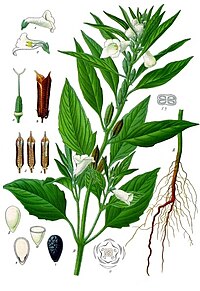
Mango polyphenolics reduce inflammation in intestinal colitis—involvement of the miR‐126/PI3K/AKT/mTOR axis in vitro and in vivo
Sign Up to like & getrecommendations! Published in 2017 at "Molecular Carcinogenesis"
DOI: 10.1002/mc.22484
Abstract: This study sought to elucidate the mechanisms underlying the anti‐inflammatory effect of mango (Mangifera Indica L.) polyphenolics containing gallic acid and gallotanins, and the role of the miR‐126/PI3K/AKT/mTOR signaling axis in vitro and in vivo.… read more here.
Keywords: mir 126; akt mtor; pi3k akt; mango ... See more keywords

Rapid and specific detection of mango (Mangifera indica) in processed food using an isothermal nucleic acid amplification assay
Sign Up to like & getrecommendations! Published in 2020 at "European Food Research and Technology"
DOI: 10.1007/s00217-020-03440-z
Abstract: Mango (Mangifera indica) is one of the most popular tropical fruits around the world. It is also widely and commonly used in many cuisines and products in the food industry. However, the anaphylactic reaction caused… read more here.
Keywords: detection mango; food; mango dna; mango ... See more keywords

Physiological and biochemical attributes associated with jelly-seed disorder in mango (Mangifera indica L.)
Sign Up to like & getrecommendations! Published in 2020 at "Acta Physiologiae Plantarum"
DOI: 10.1007/s11738-020-03079-z
Abstract: ‘Jelly-seed’ is considered as a serious disorder of mango which causes considerable postharvest losses. Due to the lack of clear understanding of jelly-seed disorder genesis and minuscule research work, a study was carried out to… read more here.
Keywords: seed; mango; jelly seed; seed disorder ... See more keywords

Effects of ripening on the in vitro antioxidant capacity and bioaccessibility of mango cv. ‘Ataulfo’ phenolics
Sign Up to like & getrecommendations! Published in 2019 at "Journal of Food Science and Technology"
DOI: 10.1007/s13197-019-03685-x
Abstract: Fruit ripening induces changes that strongly affect their matrices, and consequently, the bioaccessibility/bioavailability of its phenolic compounds. Flesh from ‘slightly’ (SR), ‘moderately’ (MR) and ‘fully’ (FR) ripe ‘Ataulfo’ mangoes were physicochemically characterized, and digested in… read more here.
Keywords: ripening vitro; mango; effects ripening; bioaccessibility ... See more keywords

Combined hot-air and microwave-vacuum drying for improving drying uniformity of mango slices based on hyperspectral imaging visualisation of moisture content distribution
Sign Up to like & getrecommendations! Published in 2017 at "Biosystems Engineering"
DOI: 10.1016/j.biosystemseng.2017.01.006
Abstract: Drying uniformity is one of the most important indicators in evaluating a drying technique as well as the final quality of dried products. In the current study, three drying approaches (hot-air drying (HAD), microwave-vacuum drying… read more here.
Keywords: drying uniformity; mango slices; hot air; mango ... See more keywords

Stable isotope dilution assay (SIDA) and HS-SPME-GCMS quantification of key aroma volatiles for fruit and sap of Australian mango cultivars.
Sign Up to like & getrecommendations! Published in 2017 at "Food chemistry"
DOI: 10.1016/j.foodchem.2016.11.130
Abstract: Reported herein is a high throughput method to quantify in a single analysis the key volatiles that contribute to the aroma of commercially significant mango cultivars grown in Australia. The method constitutes stable isotope dilution… read more here.
Keywords: mango cultivars; mango; fruit sap; key aroma ... See more keywords

Novel low-abundance allergens from mango via combinatorial peptide libraries treatment: A proteomics study.
Sign Up to like & getrecommendations! Published in 2018 at "Food chemistry"
DOI: 10.1016/j.foodchem.2018.06.113
Abstract: Mango allergy is a rare condition, which may cause severe hypersensitivity reactions, such as anaphylaxis, angioedema, asthma and contact dermatitis. By exploiting the combinatorial peptide ligand library (CPLL) technology, mango proteomes have been extracted and… read more here.
Keywords: mango; allergens mango; novel low; combinatorial peptide ... See more keywords

Effects of sugar matrices on the release of key aroma compounds in fresh and high hydrostatic pressure processed Tainong mango juices.
Sign Up to like & getrecommendations! Published in 2021 at "Food chemistry"
DOI: 10.1016/j.foodchem.2020.128117
Abstract: Sugars are critical components of fruit juice. The binding of sugars and aroma compounds may affect the release of flavor in juices. In this study, the effects of sucrose, glucose, and fructose on the release… read more here.
Keywords: high hydrostatic; aroma compounds; juice; mango ... See more keywords

A hydrocolloid based biorefinery approach to the valorisation of mango peel waste
Sign Up to like & getrecommendations! Published in 2017 at "Food Hydrocolloids"
DOI: 10.1016/j.foodhyd.2017.09.029
Abstract: Abstract An environment-friendly hydrothermal process was developed to extract pectin from a horticultural waste, namely mango peels, at a reasonable temperature and pressure. High average yields of pectin (15.7%, 27.2%) were obtained from the two… read more here.
Keywords: mango peels; biorefinery approach; hydrocolloid based; mango ... See more keywords

Phylogeny and pathogenicity of Lasiodiplodia species associated with dieback of mango in Peru.
Sign Up to like & getrecommendations! Published in 2017 at "Fungal biology"
DOI: 10.1016/j.funbio.2016.06.004
Abstract: Mango, which is an important tropical fruit crop in the region of Piura (Peru), is known to be prone to a range of diseases caused by Lasiodiplodia spp. The aim of this study was to… read more here.
Keywords: lasiodiplodia; peru; mango; dieback ... See more keywords

Irrigation water of different sources affects fruit quality attributes and heavy metals contents of un-grafted and commercial mango cultivars.
Sign Up to like & getrecommendations! Published in 2020 at "Journal of environmental management"
DOI: 10.1016/j.jenvman.2020.111895
Abstract: In peri-urban areas, waste water is used to irrigate orchards due to scarcity of fresh water which increases heavy metals contents in soils, leaves and fruits. Due to excessive waste water irrigations, heavy metals enter… read more here.
Keywords: attributes heavy; mango cultivars; mango; water ... See more keywords